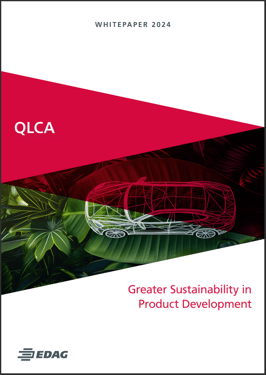The quick way to calculate the CO2 equivalent footprint of products

Sustainability and consequently also the CO2 equivalent emissions of a product are taking on an increasingly important role in our society, not least in the automotive industry. Switching to electrically powered vehicles will, however, suffice only to reduce emissions during the utilization phase.
Vehicle development yields further potential for influencing the emissions occurring during the other phases of the life cycle. The selection of the raw materials, manufacturing processes used and a sustainable, recyclable design can make a significant contribution to further reducing emissions.
Despite the various measures implemented by the automotive industry, progress has so far been slow. There is a lack of suitable tools which, if used during the concept development and design stages, can help to establish sustainability aspects as additional decision-making criteria. Having sustainable design, development and production but failing to take the carbon-equivalent footprint into account is like trying to design an affordable product without first calculating the cost.
EDAG has identified this requirement, and developed a solution of its own. The Quick Life Cycle Assessment (QLCA) helps developers to determine the global warming potential (GWP) of their concepts in the early stages of development. It enables the components and assemblies with the greatest savings potential to be identified, and alternative designs to be compared. As the tool is user-friendly and requires no LCA expertise, it can be can be put to direct use by development engineers.
What functions the web tool offers, how this helps with sustainability-focused development, and how data security and cybersecurity are ensured is revealed in our white paper "Greater Sustainability in Product Development", which can be downloaded here.
Download White paper now
** EDAG Group: EDAG Engineering Group AG, EDAG Engineering GmbH, EDAG Production Solutions GmbH & Co. KG, EDAG aeromotive GmbH